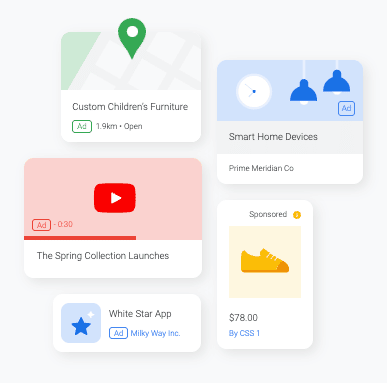Not all results are created equal.
The results returned when you type a query into Google are not equal. That’s not to say that the websites displayed on the results page won’t answer your question—or lead you to the must-have styles of the season—the distinction is how they arrived. In this article, we explain the difference between Google Ads and Organic Search, and which is more valuable to your business.
Google Ads
Google Ads connects businesses with billions of potential customers through targeted advertisements delivered via thousands of sites in the Google Display Network. The major players are owned by Google and include:
- Search
- Discovery
- Gmail
- Maps
- Play
- YouTube
Google Ads run in campaigns made up of the following:
- Headlines
- Descriptions
- Keywords
- Images
- Videos
- Bids

These share a budget, locations, targeting, and other settings. As a pay-per-click (PPC) service, businesses bid on keywords in auctions to appear in Google Search Results. Advertisers are only charged when a person clicks the ad to call their business, visit their website, find their location, or stops in their store.
Paid ads in Search appear both above and below organic results on the first and second pages of Google.
Organic Search
Organic search queries return results determined only by algorithms, totally independent of ad spend.
In fact, the results of organic searches are placed in a completely different category than sponsored results, including PPC ads and all promotions that pay the Search Engine for serving the result and any corresponding clicks.
Though Google keeps its exact (and ever-changing) formula to itself, we do know that Search algorithms work by looking at many factors and signals, including:
- Words of the query
- Relevance and usability of website pages
- Expertise of sources
- User location and settings
However, the weight applied to each of these factors varies depending on the nature of the query.
No two people will ever see the exact same Search results on Google
Google Ads vs Organic Search
| Google Ads Businesses pay to purchase immediate ranking on results pages, which populate above organic search results and other SERP (search engine results page) elements like Featured Snippets and the People Also Ask sections. Typically, paid search ads are text but may also include images and other assets, such as product listings, display ads, and videos on partner websites. | Organic Search Businesses invest in SEO (search engine optimization) to improve a website’s native rankings on results pages. Since search engines rank websites by relevance to the word typed into the query—and the algorithm’s assessment of your site—SEO ensures that your site is trustworthy, secure, and high-performing, as well as relevant to your visitors. |
Website SEO
SEO is the method by which traffic is directed to a website via free, editorial, organic, or raw results in Search Engines. Effective SEO improves a website’s position on SERP, leading to higher ranking and increased visibility.
SEO does not work instantly. Most professionals expect to see results in as little as two months, though SEO can take as long as 12 months to work.
Remember, even with a fully implemented SEO strategy, SEO work is never finished. It’s important to monitor the results, adjust tactics, keep up with algorithm changes, assess competition, and play the long game.
SEO consists of three types of optimization:
- Technical Optimization – website and server optimizations that help Search Engine spiders crawl and index your site more effectively to improve organic rankings.
- On-Page Optimization – optimizing both the website content (tags, descriptions, URLs, text, images,) and HTML source code to rank higher and earn more relevant traffic from Search Engines.
- Off-Page Optimization – the process of enhancing your site’s Search Engine rankings through offsite activities. This is largely driven by backlinks, which help to build the site’s reputation.
SEO & Content Creation
Quality content engages, informs, supports, and gratifies your visitors. Moreover, creating valuable, authentic, trustworthy content is critical for search engine visibility.
Content is priority #1 when it comes to SEO
Content creates the foundation to support all of your other SEO efforts and may include:
- Blogs
- Content assets (white papers, case studies, eBooks, webinars, podcasts, brochures, etc.)
- Calls to action
- Landing pages
- Testimonials
- Audio & video content
- Visual content (images, infographics, presentations)
Content Quality
Creating substantive, useful, and unique content is what brings visitors to your site and compels them to stay on your pages, building familiarity and trust.
Investing in a clear content strategy is imperative to your SEO success and should be based on the following:
- Research – keyword research helps develop content that answers what people are searching for
- Freshness – search engines love timely, up-to-date, fresh information
- Features – optimizing content for Featured Snippets and direct answers yields more visibility than a standard organic search result
- Depth – content should be deep enough to answer the user’s query in a substantial, complete, or comprehensive manner
- Multimedia – images, video, audio, animation, and interactivity provide added exposure in search results
Google Ads or SEO?
So, which is better for your business, Google Ads or SEO?
The real answer is BOTH…but we’ll break it down by objective.
Google Ads is an immediate solution for reaching potential customers, through audience targeting and campaign customization, by driving short-term traffic to your site.
SEO requires patience and an ongoing process but is the single-most important tool for marketing your website on a permanent basis. Simply put, SEO enhances your business’ presence and helps people find it online.
At Top Fox Marketing, our suggestion is to invest in a solid and consistent SEO strategy for brand awareness, along with a Google Ads campaign to bring in qualified leads. Contact us to get started!



